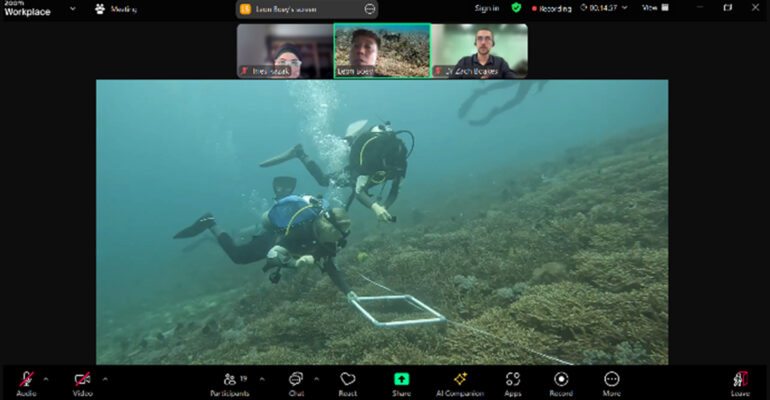Coral Reef Restoration Efforts, SCORES IPB University Presents Livingseas Practitioners

The Department of Marine Science and Technology (ITK) of IPB University through the School of Coral Reef Restoration (SCORES) successfully held a webinar entitled “Keys to Successful Coral Reef Restoration: The Importance of Maintenance and Monitoring”.
In his opening remarks, the Secretary of the Department of ITK IPB University, Dr Beginer Subhan, expressed the hope of holding the SCORES webinar in this 3rd season.
“It is hoped that this webinar can increase awareness of the importance of maintenance and monitoring in coral reef restoration, as one of the keys to the success of coral reef restoration,” he said.
Meanwhile, Dr Tries Blandine Razak, as a coral reef expert from IPB University, expressed her hopes for SCORES in the future.
“By presenting speakers who have successful experiences in coral reef restoration, it is hoped that SCORES will not only provide a place to discuss coral reef restoration, but can directly provide real action to restore coral reefs in Indonesia that have been damaged in a sustainable manner,” she said.
The webinar presented Leon Bay as founder of the Livingseas Foundation. Leon emphasized that monitoring is an important element in the success of restoration.
“Monitoring is carried out every six months to observe the condition of corals, fish, and the surrounding ecosystem. In an effort to maximize coral reef restoration, Livingseas strives to make the substrate covered by corals,” he explained.
For example, he continued, Livingseas used a bottle as a substrate to grow Galaxea corals, which in four years managed to completely cover the bottle.
“Besides monitoring, maintenance is also key. During the first six months, maintenance is carried out consistently, including cleaning of algae, dead corals, and sponges attached to the structure. Without maintenance, the restoration structure will grow algae faster than corals,” he continued.
On this occasion, Leon also explained the innovation of “Super Star”, a large restoration structure designed to optimally support coral growth.
The webinar also explored the importance of sustainable funding. Leon offers a unique approach by involving tourists in restoration activities, such as diving for coral maintenance.
“Through this hands-on experience package, tourists not only contribute funds, but are also actively involved in environmental conservation efforts,” he concluded.
The webinar participants seemed enthusiastic and asked various questions during the discussion session. This webinar is also expected to provide in-depth insight into the importance of monitoring, maintenance, and innovation in coral reef restoration. (*/Nr) (IAAS/Aly)



